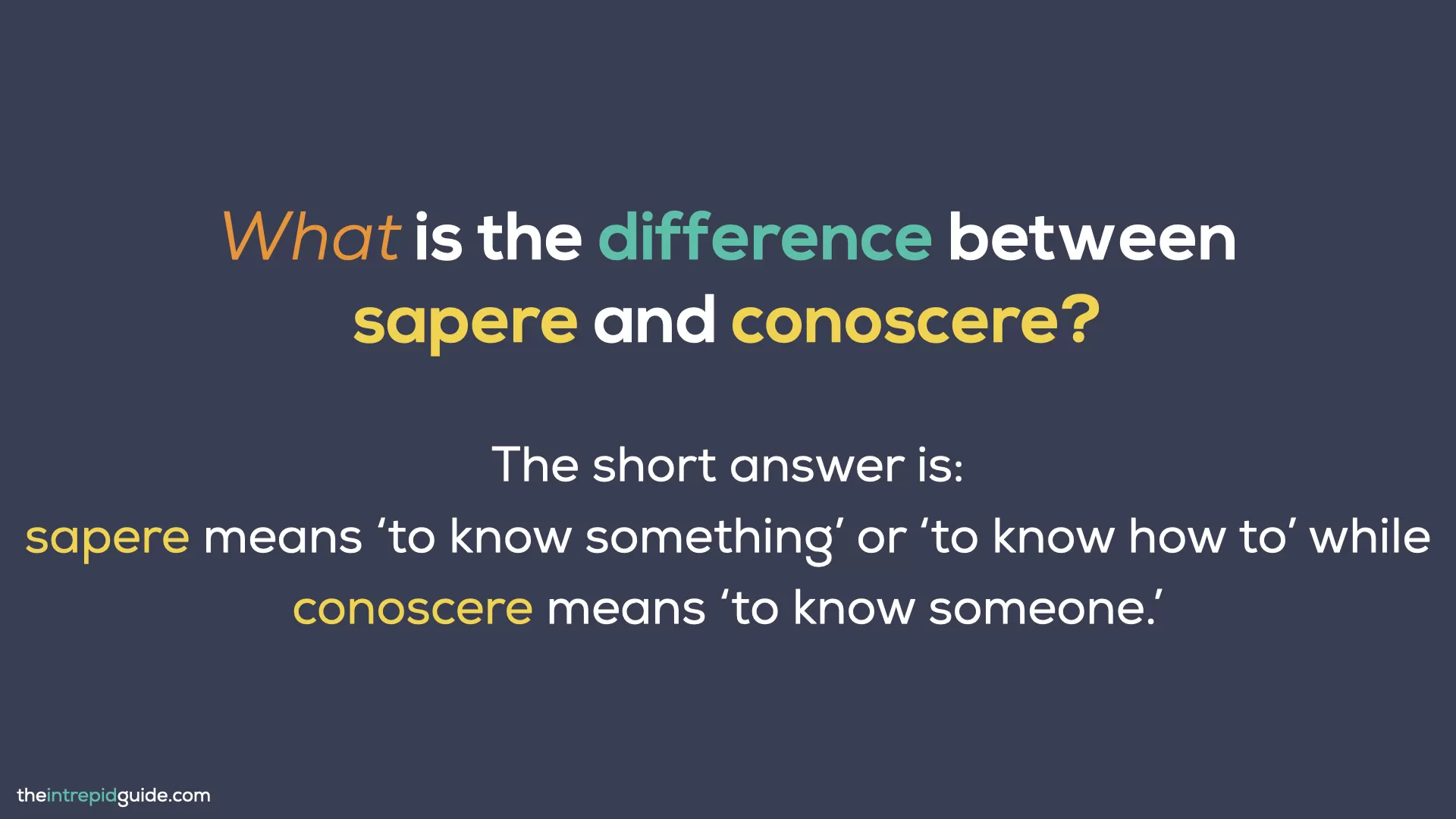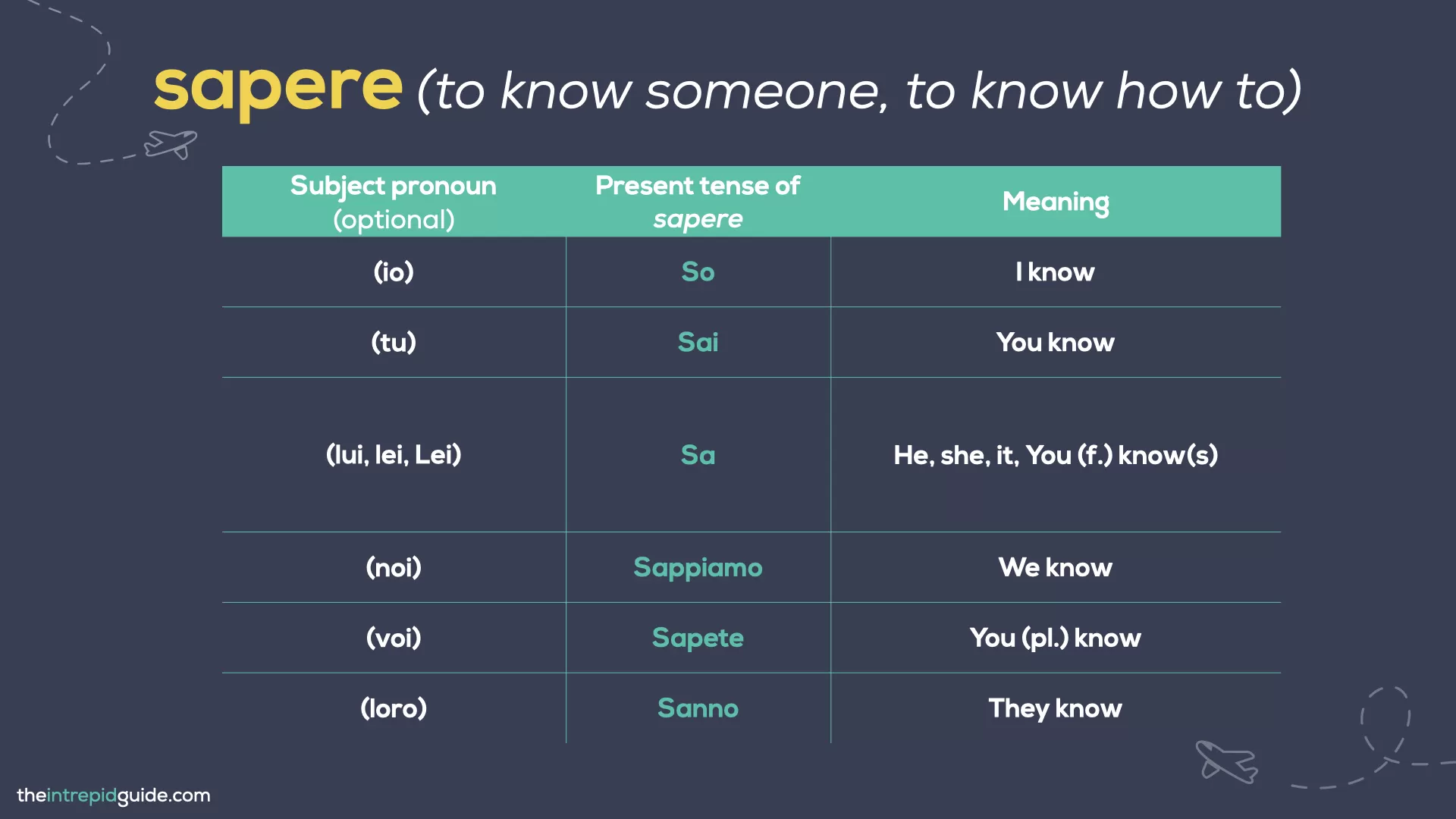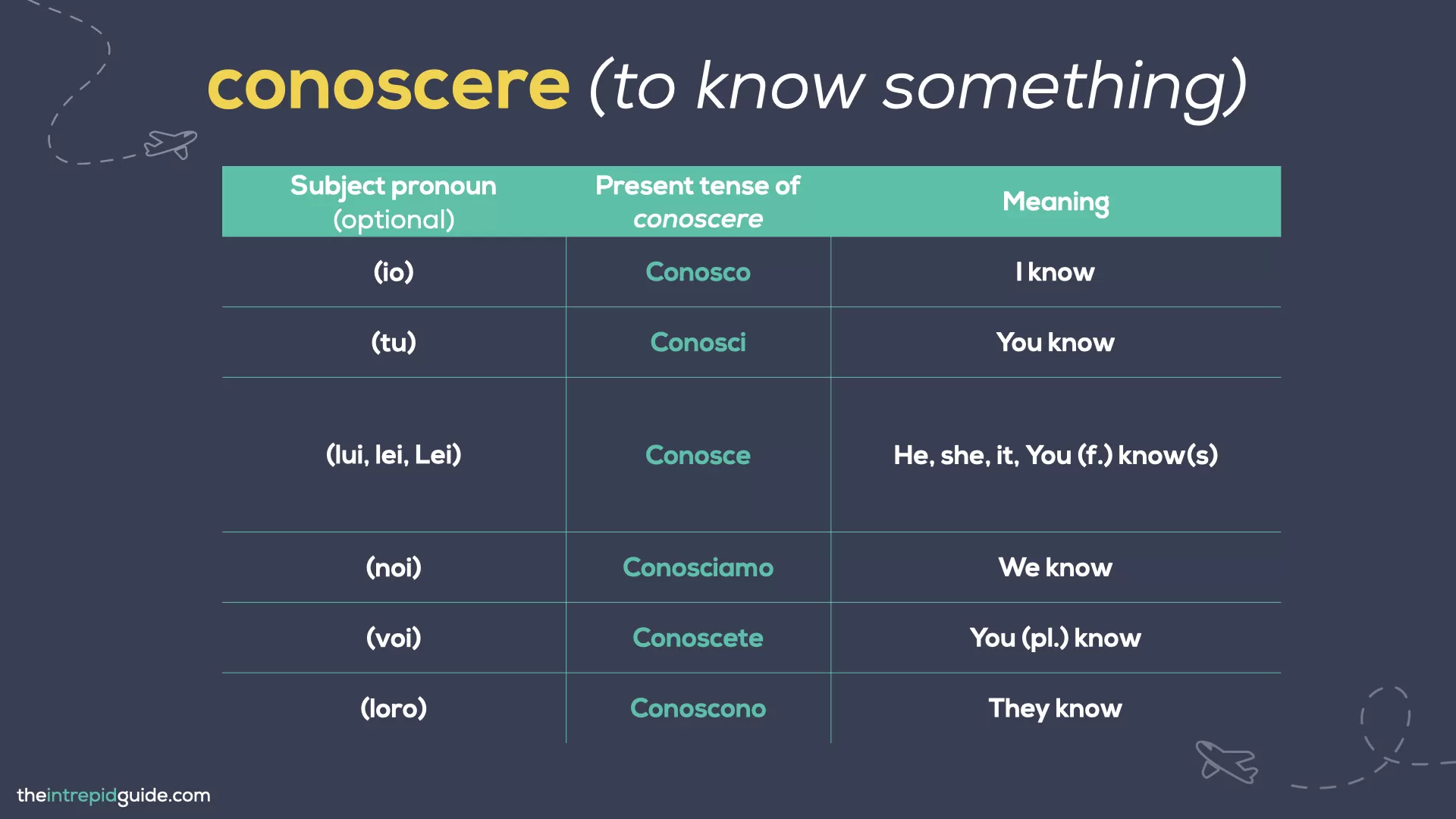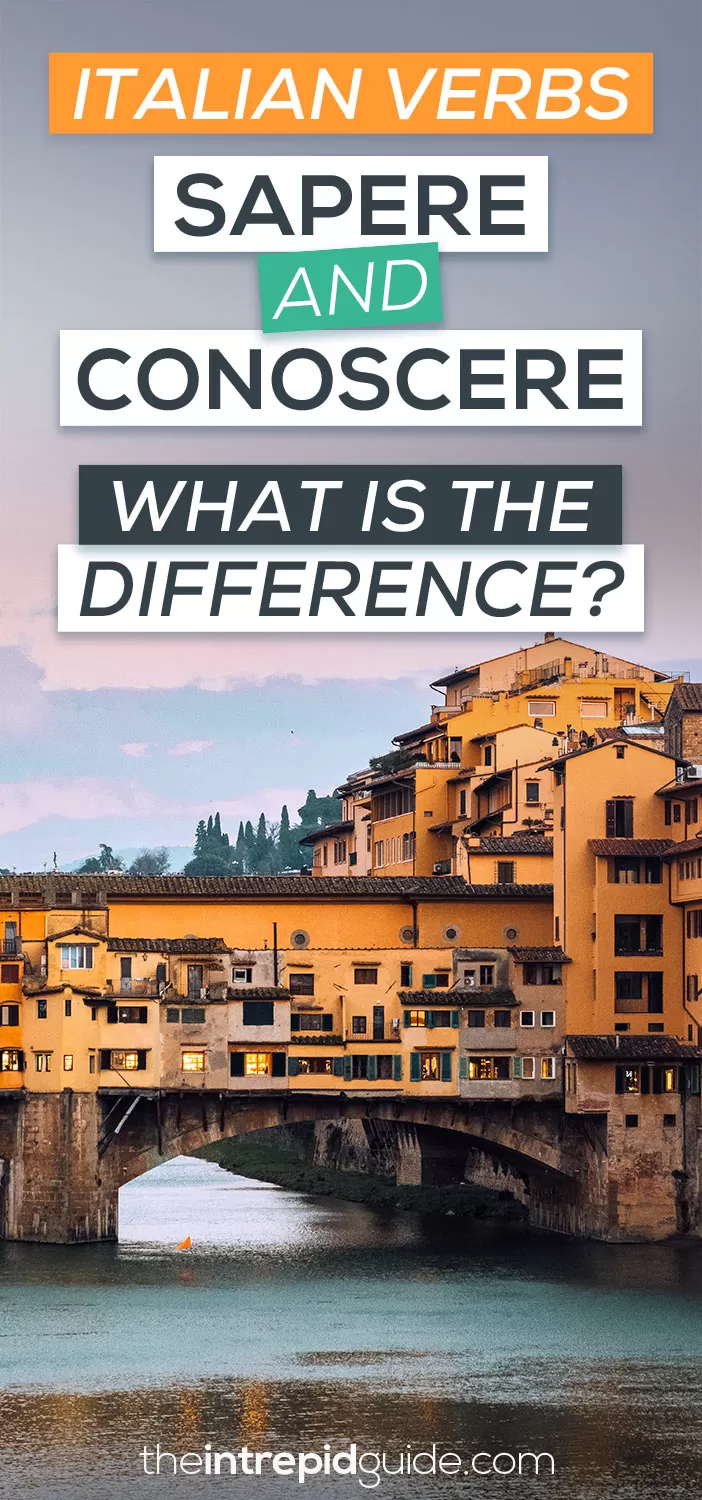I once came across this Italian phrase:
C’è una profonda differenza tra sapere e conoscere. Le persone possono sapere tutto di te, ma non conoscerti affatto.
This could be translated to: ‘there is a profound difference between knowing and knowing. People may know everything about you, but they may not know you at all’.
If at first glance, this doesn’t make any sense to you, it’s because the Italian language has two different verbs that mean ‘to know’: sapere and conoscere. These Italian verbs are not interchangeable and each of them describes different shades of ‘knowing’ something.
Since their meanings often get confused, I’ve decided to provide some clarity on the difference between them! In this guide, I’m going to show when to use sapere and when to use conoscere according to the context. Of course, I will give you plenty of practical examples to help you understand better. There’s even a fun little quiz at the end so you can test your skills!
Iniziamo! (Let’s begin!)
What is the difference between SAPERE and CONOSCERE?

*Tip: For a list of common Italian verbs, get my free guide here. It includes a FREE PDF cheat sheet you can download and practice with.
The Italian verb SAPERE
Here is the conjugation of sapere in the present tense.
| Verb conjugation | English translation | |
|---|---|---|
| (io) | So | I know |
| (tu) | Sai | You know |
| (lui, lei, Lei) | Sa | He, she, it, You (f.) know(s) |
| (noi) | Sappiamo | We know |
| (voi) | Sapete | You (pl.) know |
| (loro) | Sanno | They know |
The past participle of sapere is regular: saputo.
Find out more about how to easily conjugate Italian verbs here or watch my video below.
Let’s now move on and see the two cases when we use sapere and what it means.
1. Talking about skills / abilities
The first use of sapere is as a so-called ‘modal verb’. Modal verbs are verbs, which often combine with other verbs in the infinitive form. The most common ones are potere, dovere, volere.
With this meaning, sapere is used to describe a skill, the ability to do something, like playing sports, singing, dancing, and so on.
Look at the following examples:
- So suonare la chitarra. (I can play the guitar.)
- Sai andare in bicicletta? (Can you ride a bike?)
- Maria non sa scrivere, ha solo tre anni. (Maria doesn’t know how to write. She’s only three years old.)
The first thing you will notice is that in the three examples, sapere is followed by another verb in the infinitive mode (suonare, andare, scrivere). This is how a modal verb works!
Secondly, we are talking here about the ability to do something, so it can’t be translated as ‘to know’ in English, but rather ‘can’ or ‘to know how to’. In fact, the meaning of sapere here is that of a practical knowledge, not a theoretical one.
- Io so… parlare molte lingue, cucinare, e giocare a tennis. (I can… speak many languages, cook, and play tennis.)
- E tu (and you)? Cosa sai fare (what can you do)? Let me know in the comments!
2. Superficial knowledge
The verb sapere can also be used on its own, just like any other verb we know. It is mostly used to describe a superficial knowledge, which is not the result of in-depth study. It’s a passive knowledge acquired from external sources. Look at the following examples:
- Sai a che ora apre il fruttivendolo? (Do you know at what time the greengrocer opens?)
- Non so come si chiama quell’attore, ma so che è molto famoso. (I don’t know the name of this actor, but I know he’s very famous)
- So che Laura si sposa, ma non so quando. (I know that Laura is getting married, but I don’t know when.)
The first thing to notice here, is that sapere is often followed by a secondary clause (or subordinate phrase) introduced by a Italian conjunctions, like che, quando, a che ora, come, perché, etc.
Also, the type of knowledge described by sapere has been acquired in a passive way: I know/don’t know at what time the greengrocer opens because I read/I didn’t read the opening times; I’ve seen that actor many times so that means he must be famous; I’ve heard that Laura is getting married or someone told me.
Attenzione! In the passato prossimo tense, sapere has a slightly different meaning. Look at the following example:
- Ho saputo che hai vinto la gara di atletica. Complimenti! (I found out you won the athletic competition. Congrats!)
The passato prossimo tense of sapere means ‘to find out’, ‘to learn about something’, ‘to discover’.
Now that we have an overview of the verb sapere, let’s see when and how we use the verb conoscere.
The Italian verb CONOSCERE
Here is the conjugation of conoscere in the present tense.
| Verb conjugation | English translation | |
|---|---|---|
| (io) | Conosco | I know |
| (tu) | Conosci | You know |
| (lui, lei, Lei) | Conosce | He, she, it, You (f.) know(s) |
| (noi) | Conosciamo | We know |
| (voi) | Conoscete | You (pl.) know |
| (loro) | Conoscono | They know |
The past participle of conoscere is regular: conosciuto.
Let’s now move on and see the two cases when we use conoscere and what it means.
1. Knowledge of people
The first and most immediately understandable use of the verb conoscere in Italian is when talking about people.
- Piacere di conoscerti/conoscerLa! (Nice to meet you! – informal/formal)
Even as a beginner, I’m sure you’ve come across this super common Italian phrase. It’s said/heard when you’re introduced to someone. When you meet a person, you enter into a relationship with that person, so you know/get to know them, even if it’s just for a second. In fact, with people we use the verb conoscere.
Let’s take a look at the following examples:
- Conosco Sara, è la nuova ragazza di mio fratello. (I know Sara, she’s my brother’s new girlfriend.)
- I miei genitori conoscono molti professori in questa università. (My parents know many professors in this university.)
- Conosci il dottor Mariani? È davvero bravo. (Do you know Doctor Mariani? He’s really good.)
Regardless if it’s followed by a proper name, a title, or any other noun indicating a person, conoscere is the right verb to use here!
2. Deeper knowledge
There’s another case when we use conoscere, that is, to talk about a deeper knowledge. Unlike sapere, when you use conoscere you don’t just happen to know a piece of information, or learn it because somebody told you.
We use the verb conoscere when the knowledge is acquired as a result of studying, deepening, dialogue, reading, etc. – It is an active knowledge.
Let’s look at some examples:
- Matteo ama la letteratura francese. Conosce tutte le opere di Baudelaire. (Matteo loves French literature. He knows all the works of Baudelaire.)
- Conoscete la differenza tra ‘andare’ e ‘venire’? (Do you guys know the difference between ‘andare’ and ‘venire’?)
- Carlo conosce bene il tedesco. Vive in Germania da cinque anni. (Carlo knows German very well. He has lived in Germany for 5 years.)
Notice how conoscere is always followed by a noun, and not a secondary clause, like what happens with sapere.
In all these examples, we have a kind of knowledge that is active, aware, and deep: he knows Baudelaire’s works, because he studies them and he’s passionate about it; I know the difference between ‘andare’ and ‘venire’, I learned it from you; he knows German, he studied it actively.
Conoscere cannot be used as a modal verb, so you will never see it in combination with a verb in the infinitive form, like sapere.
Attenzione! Like sapere, the passato prossimo tense of conoscere has a slightly different meaning, which is: ‘to meet’. For example:
- Ho conosciuto mio marito vent’anni fa. (I met my husband twenty years ago.)
SAPERE and CONOSCERE: What is the Difference?
If we go back to our Italian phrase:
C’è una profonda differenza tra sapere e conoscere. Le persone possono sapere tutto di te, ma non conoscerti affatto.
We’ll see that sapere is used to indicate people knowing facts about you (superficial knowledge), whereas conoscere refers to knowing a person (thus indicating a deeper knowledge of that person).
Let me give you one more tip: The situation where it is easiest to confuse sapere and conoscere is when we are dealing with an idea or a piece of information. In this case, the verb sapere is used more than the verb conoscere. But remember, it all depends on how this idea or this information has been acquired, whether in an active or in a passive way: if in a passive way we use the verb sapere, if in an active way, because it is the result of studying and reading, etc., we use the verb conoscere.
Here is one more example:
- Cosa sai di Ponte Vecchio? (What do you know about Ponte Vecchio?)
- So solo che è un ponte che si trova a Firenze (→ superficial knowledge), ma non conosco la sua storia (→ deeper knowledge. (I just know it’s a bridge located in Florence, but I don’t know its history.)
Hai capito? (Do you understand?) Now test yourself by taking my free quiz below. Read the sentences and choose which verb is more appropriate to use sapere or conoscere. Share your score in the comments!
 Are you a beginner or an intermediate Italian learner? Got a trip coming up or want to communicate with your Italian partner or relatives in Italian? Learn Italian with my unique 80/20 method
Are you a beginner or an intermediate Italian learner? Got a trip coming up or want to communicate with your Italian partner or relatives in Italian? Learn Italian with my unique 80/20 method
Registrations are now open to join Intrepid Italian, my new series of online video courses that use my unique 80/20 method. You’ll go from a shy, confused beginner to a proficient and confident intermediate speaker, with me as your trusty guide.
You’ll finally be able to connect with your Italian partner, speak to your relatives and enjoy authentic travel experiences in Italy like you’ve always dreamed of, and so much more.
As a native English speaker who learned Italian as an adult, I know what it’s like to feel hopeless and lack the confidence to speak. I know what it’s like to start from scratch and to even go back to absolute basics and learn what a verb is!
Intrepid Italian was created with YOU in mind. I use my working knowledge of the English language to help you get into the ‘Italian mindset’ so you can avoid the common pitfalls and errors English speakers make – because I made them once too! I break everything down in such a way that it ‘clicks’ and just makes sense.
No matter what your level is, there is an Intrepid Italian course for you, including:
- 🇮🇹 Intrepid Italian for Beginners (A1)
- 🇮🇹 Intrepid Italian for Advanced Beginners (A2)
- 🇮🇹 Intrepid Italian for Intermediates (B1)
You can join 1, 2, or all 3 courses, it’s entirely up to you. The best part is that you have lifetime access so you learn anytime, anywhere and on any device.
As your guide, I walk you through each lesson, step-by-step, using my unique 80/20 method. My approach is different from traditional methods because I teach you the most important 20% of the language right from the beginning so you can start to speak straight away.
Each course includes video lessons, audio exercises, downloadable worksheets, bonus guides, a private support community, and lifetime access all designed to streamline your learning while having fun.
It even comes with my famous “Celebrate with a Spritz Guarantee”. After 30 days of using Intrepid Italian, if you don’t want to celebrate your new-found Italian skills with an Aperol Spritz, you don’t have to pay a penny! Cheers! 🥂
Join Intrepid Italian here and start learning today!
Ci vediamo lì! (See you there!)
Like it? Pin it for later!
Learning Italian? Don’t miss these Italian language guides
- What is your level in Italian? Find out with this FREE quiz!
- What is the best way to learn Italian? Here’s how I did it!
- How to Conjugate Italian Verbs in 3 Simple Steps [Italian for Beginners]
- 15 Italian Words You Should NEVER Mispronounce [& How Not To]
- Italian Numbers: How to Count in Italian From 0 to 1 Billion (Plus PDF Download)
- Master Days of the Week in Italian (7 Simple Memory Hacks)
- How to Order Food & Drinks in Italian [Italian for Beginners]
- Is Italian Hard to Learn? 7 Common Mistakes & How to Avoid Them
- 41 Italian Greetings: How to Say ‘Hello’ in Italian Like a Local
- 11 Effective Hacks That’ll Help You Learn Italian So Much Faster
- Top 14 Italian Words You Should NEVER Say [& What to Use Instead]
- 20 Hilarious Everyday Italian Expressions You Should Use
- Romanesco: 25 Cool Roman Dialect Words You Should Use in Rome
- 10 Reasons Why Learning Italian Will Change Your Life
- How to Learn Italian Before Your Trip
- 10 Italian Expressions Italians Love Saying
- Italian for Beginners | 8 DEADLY Mistakes in Italian (& How to Avoid Them)
- 10 Italian Phrases That Will Instantly Make You Sound more Italian
- Funny Italian Sayings: 26 Food-Related Insults You Won’t Forget
- 15 Romantic Italian Films That’ll Make You Love Italy Even More
- How to Master Common Italian Phrases for Travel (Like a Local!)
Over to you!
Did you find this guide useful? What other verbs do you mix up in Italian? Let me know using the comments section below or join me on social media to start a conversation.
Thanks for reading and I hope you enjoyed this post.
Like what you see? Subscribe using the form below to have all of my posts delivered directly to your email.





